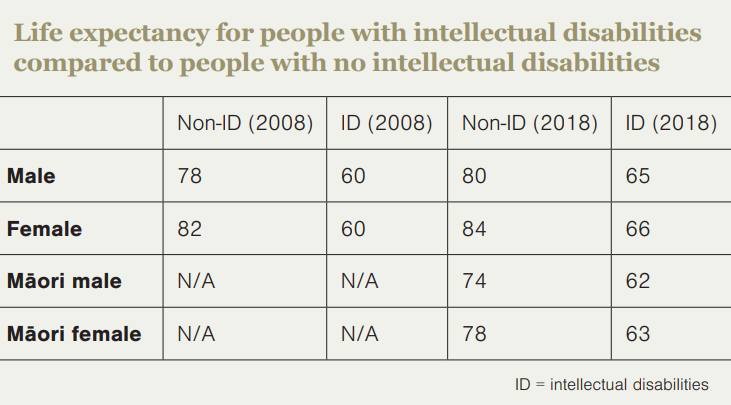Respiratory physician Lutz Beckert considers chronic obstructive pulmonary disease management, including the prevention of COPD, the importance of smoking cessation and pulmonary rehabilitation, and the lifesaving potential of addressing treatable traits. He also discusses the logic of inhaler therapy, moving from single therapy to dual and triple therapy when indicated, as well as other aspects of management
Health crisis persists for people with intellectual disabilities
Health crisis persists for people with intellectual disabilities

Intellectually disabled people can expect to live 20 years less than the general population; for Māori, the gap is even wider. IHC New Zealand advocate Shara Turner outlines a profound system failure
It is imperative to address the root causes of healthcare disparities faced by intellectually disabled people
We have a profound healthcare crisis disproportionately affecting intellectually disabled people and exacerbating existing health disparities.
IHC New Zealand has recently released a large volume of quantitative data about intellectually disabled people in a report titled, From Data to Dignity: Health and Wellbeing Indicators for New Zealanders with Intellectual Disability.
Shocking statistics reveal a stark contrast in healthcare outcomes between this vulnerable group and the general population, shedding light on systemic failures and urgent needs for reform.
Recent data underscores a glaring disparity in life expectancy between intellectually disabled people and the general populace. Females with intellectual disabilities have a life expectancy of 66 years compared with 84 years in the general female population, while males with intellectual disabilities have a life expectancy of 65 years versus 80 years for males in the general population. For Māori with intellectual disabilities, the gap is even wider, with life expectancies as much as 12 years below the general Māori population.
The burden of cardiovascular and respiratory diseases weighs heavily on intellectually disabled people, further shortening their life expectancy. They are over two times more likely to have coronary heart disease and 1.5 times more likely to be diagnosed with chronic obstructive pulmonary disease compared with the general population. Alarmingly, Māori and Pacific peoples face even higher risks, indicating deep-rooted health disparities within these communities.
The mental health crisis among intellectually disabled people is equally concerning. They are disproportionately affected by mood disorders, psychotic disorders and dementia, with staggering differences in prevalence compared to the general population, with dementia onset at 45 for intellectually disabled people. The prevalence of psychotic disorders among intellectually disabled people is particularly alarming, at almost 16 times higher than that of the general population.
The healthcare use patterns of intellectually disabled people paint a grim picture of their access to care. Emergency room visits and hospitalisations for injuries are significantly more common among this group, indicating suboptimal primary care and preventive services.
Shockingly, these hospitalisations include a sizeable number of cases that could have been prevented with earlier intervention, with intellectually disabled people over three times more likely to be hospitalised for a potentially avoidable cause, adding strain to an already burdened healthcare system.
The economic burden of healthcare disparities on intellectually disabled people is profound. Secondary healthcare costs for this group are nearly five times higher on average compared to the general population, with the divide widening significantly in the 45–54 age bracket to over seven times the cost.
The revelations arising from these statistics demand immediate and concerted action from policymakers, healthcare providers and communities across New Zealand. It is imperative to address the root causes of healthcare disparities faced by intellectually disabled people, including systemic barriers to access, inadequate support services and stigma surrounding intellectual disabilities.
Comprehensive reforms are needed to ensure equitable healthcare provision, tailored interventions, and enhanced support networks for intellectually disabled people and their families. This includes investment in preventive care, mental health services, and culturally responsive care models to address the unique needs of diverse communities.
In a country committed to fairness and inclusivity, it is essential to confront the stark realities of healthcare inequality facing intellectually disabled people. By prioritising their health and wellbeing, New Zealand can uphold its values of compassion, equity and respect for all its citizens. The time for action is now.
2.2 times more likely to have coronary heart disease
1.5 times more likely to have chronic obstructive pulmonary disease
1.7 times more likely to have diabetes
3 times more likely to have a mood disorder
16 times more likely to have a psychotic disorder
3.6 times more likely to have dementia
2.7 times more likely to have a mental disorder
2.7 times more likely to visit emergency departments
3.6 times more likely to have a potentially avoidable hospitalisation.
We're publishing this article as a FREE READ so it is FREE to read and EASY to share more widely. Please support us and our journalism – subscribe here
One of the benefits of subscribing is you will also be able to share your thoughts about what you read with others in our Comment Stream. You can also take notes on what you read with Capture








![Barbara Fountain, editor of New Zealand Doctor Rata Aotearoa, and Paul Hutchison, GP and senior medical clinician at Tāmaki Health [Image: Simon Maude]](/sites/default/files/styles/thumbnail_cropped_100/public/2025-03/Barbara%20Fountain%2C%20editor%20of%20New%20Zealand%20Doctor%20Rata%20Aotearoa%2C%20and%20Paul%20Hutchison%2C%20GP%20and%20senior%20medical%20clinician%20at%20T%C4%81maki%20Health%20CR%20Simon%20Maude.jpg?itok=-HbQ1EYA)
![Lori Peters, NP and advanced health improvement practitioner at Mahitahi Hauora, and Jasper Nacilla, NP at The Terrace Medical Centre in Wellington [Image: Simon Maude]](/sites/default/files/styles/thumbnail_cropped_100/public/2025-03/2.%20Lori%20Peters%2C%20NP%20and%20advanced%20HIP%20at%20Mahitahi%20Hauora%2C%20and%20Jasper%20Nacilla%2C%20NP%20at%20The%20Terrace%20Medical%20Centre%20in%20Wellington%20CR%20Simon%20Maude.jpg?itok=sUfbsSF1)
![Ministry of Social Development health and disability coordinator Liz Williams, regional health advisors Mary Mojel and Larah Takarangi, and health and disability coordinators Rebecca Staunton and Myint Than Htut [Image: Simon Maude]](/sites/default/files/styles/thumbnail_cropped_100/public/2025-03/3.%20Ministry%20of%20Social%20Development%27s%20Liz%20Williams%2C%20Mary%20Mojel%2C%20Larah%20Takarangi%2C%20Rebecca%20Staunton%20and%20Myint%20Than%20Htut%20CR%20Simon%20Maude.jpg?itok=9ceOujzC)
![Locum GP Helen Fisher, with Te Kuiti Medical Centre NP Bridget Woodney [Image: Simon Maude]](/sites/default/files/styles/thumbnail_cropped_100/public/2025-03/4.%20Locum%20GP%20Helen%20Fisher%2C%20with%20Te%20Kuiti%20Medical%20Centre%20NP%20Bridget%20Woodney%20CR%20Simon%20Maude.jpg?itok=TJeODetm)
![Ruby Faulkner, GPEP2, with David Small, GPEP3 from The Doctors Greenmeadows in Napier [Image: Simon Maude]](/sites/default/files/styles/thumbnail_cropped_100/public/2025-03/5.%20Ruby%20Faulkner%2C%20GPEP2%2C%20with%20David%20Small%2C%20GPEP3%20from%20The%20Doctors%20Greenmeadows%20in%20Napier%20CR%20Simon%20Maude.jpg?itok=B0u4wsIs)
![Rochelle Langton and Libby Thomas, marketing advisors at the Medical Protection Society [Image: Simon Maude]](/sites/default/files/styles/thumbnail_cropped_100/public/2025-03/6.%20Rochelle%20Langton%20and%20Libby%20Thomas%2C%20marketing%20advisors%20at%20the%20Medical%20Protection%20Society%20CR%20Simon%20Maude.jpg?itok=r52_Cf74)
![Specialist GP Lucy Gibberd, medical advisor at MPS, and Zara Bolam, urgent-care specialist at The Nest Health Centre in Inglewood [Image: Simon Maude]](/sites/default/files/styles/thumbnail_cropped_100/public/2025-03/7.%20Specialist%20GP%20Lucy%20Gibberd%2C%20medical%20advisor%20at%20MPS%2C%20and%20Zara%20Bolam%2C%20urgent-care%20specialist%20at%20The%20Nest%20Health%20Centre%20in%20Inglewood%20CR%20Simon%20Maude.jpg?itok=z8eVoBU3)
![Olivia Blackmore and Trudee Sharp, NPs at Gore Health Centre, and Gaylene Hastie, NP at Queenstown Medical Centre [Image: Simon Maude]](/sites/default/files/styles/thumbnail_cropped_100/public/2025-03/8.%20Olivia%20Blackmore%20and%20Trudee%20Sharp%2C%20NPs%20at%20Gore%20Health%20Centre%2C%20and%20Gaylene%20Hastie%2C%20NP%20at%20Queenstown%20Medical%20Centre%20CR%20Simon%20Maude.jpg?itok=Z6u9d0XH)
![Mary Toloa, specialist GP at Porirua and Union Community Health Service in Wellington, Mara Coler, clinical pharmacist at Tū Ora Compass Health, and Bhavna Mistry, specialist GP at Porirua and Union Community Health Service [Image: Simon Maude]](/sites/default/files/styles/thumbnail_cropped_100/public/2025-03/9.%20Mary%20Toloa%2C%20Porirua%20and%20Union%20Community%20Health%20Service%20in%20Wellington%2C%20Mara%20Coler%2C%20T%C5%AB%20Ora%20Compass%20Health%2C%20and%20Bhavna%20Mistry%2C%20PUCHS%20CR%20Simon%20Maude.jpg?itok=kpChr0cc)